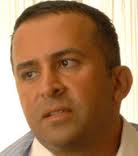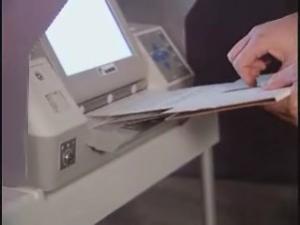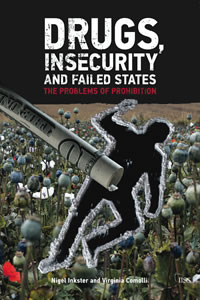
Dr. Ali
The case of Florida physician Dr. Ali
Shaygan has been closely watched by pain-management doctors -- an area in which the federal government has waged a fierce "war on prescription doctors" -- a war fueled by a rising death toll in recent years from prescription drug overdoses in America, but also preceding that rise. Since 2003, according to DEA, hundreds of physicians across the nation have been charged in federal or state court for illegally dispensing narcotic pain medicine to patients.
This past August, the
11th US Circuit Court of Appeals overturned the trial court decision awarding the money to
Shaygan, who had operated a Miami pain clinic. He was acquitted in March 2009 of 141 counts of illegally distributing narcotics to patients, including one case where a patient died of an overdose.
Shaygan's attorneys charged that two Assistant US Attorneys, Sean Cronin and Andrea Hoffman, as well as a DEA agent, had acted "vexatiously" and withheld materially important evidence after
Shaygan was originally charged in a 23-count indictment. US Circuit Court Judge Alan Gold, who presided over the high-profile trial, agreed that prosecutors violated disclosure requirements by withholding information from the defense and the court and ordered the cash award.
Judge Gold also accused the government of launching a separate "tactical" effort to disqualify the doctor's attorney, David Markus, shortly before the trial began. In that effort, which Gold characterized as part of a scheme to undermine the defendant's rights to a fair trial, the prosecutors failed to notify the defense that the DEA had attempted to manipulate two witnesses in the case into trying to entrap Markus into paying off witnesses to give favorable testimony at the trial to help the doctor beat the rap.
Following a sanction hearing after the doctor's acquittal in 2009, Judge Gold issued a scathing ruling against the prosecutors. The government conduct was so "profoundly disturbing that it raises troubling issues about the integrity of those who wield enormous power over the people they prosecute," Gold concluded.
After Gold requested that the Justice Department investigate the government's misconduct, prosecutor Cronin conceded to the
Miami Herald, "We should have done a better job," but insisted that "at no time was I acting in bad faith."
He said he authorized secret recordings of attorney Markus because a witness, Courtney Tucker, had told a DEA agent the defense might be trying to tamper with her testimony. Yet Tucker contradicted Cronin's claim when she testified that a DEA agent had tried to pressure her to tailor her testimony to bolster the prosecution's case against Dr.
Shaygan.

When federal prosecutors appealed the cash award to the
11th Circuit, a sharply divided panel overturned it, holding that Gold had overreached and wrongly interpreted the Hyde Amendment by applying the incorrect legal standard for awarding the fees under the statue. The appeals court majority also held that "as long as a prosecutor had an objectively reasonable basis in law (not frivolous and not vexatious), an award of attorney fees under the Hyde Amendment is improper." One judge concluded that the overall prosecution and allegations on the original indictment were "objectively valid."
But in a harsh dissent, Judge Beverly Martin wrote that the majority opinion "will render trial judges mere spectators of extreme government misconduct."
Markus told the Chronicle the appeals court reversal was not what he expected. "The decision was surprising given how the oral argument went and how thorough Judge Gold's order was," Markus said, adding that he was appealing to the Supreme Court.
Now a coalition of former federal judges and prosecutors, organized by the bipartisan group the
Constitution Project has signed onto an
amicus brief supporting Markus's
writ of certiorari asking the Supreme Court to overturn the appeals court decision and reinstate the cash award in
US v. Shaygan.
"When a court bends the law to excuse a prosecutor's bad faith, public confidence in the criminal justice system suffers," the Constitution Project brief said.
Just Another Pain Doctor Prosecution
The wheels of justice in Dr.
Shaygan's case began turning on June 9, 2007, when one of the long-term patients at his pain clinic, James Brendan Downey, died of a drug overdose from a fatal combination of prescribed methadone and illegal cocaine.
Shaygun had prescribed the methadone to Downey two days before he died, and an autopsy found that the levels of methadone in his blood alone were enough to kill him.
In a subsequent undercover sting operation, two Florida police officers posed as potential patients at
Shaygan's office to determine how easily they could obtain prescribed narcotics. Federal prosecutors said both officers obtained a prescription for controlled substances on their first visit without presenting medical records, and that
Shaygan only administered minimal physical examination.

Judge Gold
On February 8, 2008, the Southern Florida US Attorneys Office filed a 23-count indictment against
Shaygan alleging that "the doctor distributed and dispensed controlled substances outside the scope of professional practice unintended for legitimate medical purposes in violation of 21 U.S.C. 841."
Three days later, DEA agents arrested
Shaygan at his office. Agents seized
Shaygan's active patient files and even confiscated his leather-bound daily planner. Prosecutors said that DEA agents reported that
Shaygan allegedly made a statement to the effect, "I want to cooperate." On May 14, Markus filed a motion to suppress his client's statement during his arrest.
At a post-hearing on the suppression motion held on August 2008, Markus clashed with lead prosecutor Cronin over Markus's attempt to keep his client's alleged statement from being heard by the jury. Cronin threatened Markus with an enhanced prosecution of his client if he persisted in that strategy.
"Cronin told me that if we litigated the suppression issues, there would be no more plea discussions, and that if I went after his witnesses (DEA agents), there would be a 'seismic shift' in the way he would prosecute the case against Mr.
Shaygan," Markus said.
Markus dismissed Cronin's threat and forged ahead with the suppression hearing, offering up damaging testimony by
Shaygan, who testified that DEA agents, while flashing their weapons, continued to interrogate him, despite his request to speak with a lawyer. Agents denied this happened. After hearing from a defense witness that he overheard
Shaygan say, "May I please have my lawyer," Judge Gold granted the motion to suppress, which barred prosecutors from using
Shaygan's statements during the trial.
Then, playing legal hardball, prosecutor Cronin made good on his threat, filing an additional 108 drug charges against
Shaygan totaling hundreds of years in prison and bringing the total number of charges filed against him to 131. Cronin filed the extra charges after DEA agent Chris Wells located and interviewed
Shaygan's former patients Carlos
Vento, Trinity
Clendening, Courtney Tucker and Andrew
McQuarrie. These former patients would play a pivotal role in the misconduct allegations against federal prosecutors Cronin and Hoffman.
Before trial, prosecutors Cronin and Hoffman received a tip from DEA agent Wells that
Shaygan's defense team might be tampering with the witnesses. Wells said one witness, Courtney Tucker, "was about to go south and not testify." Prosecutors relayed this new information to Karen Gilbert, the Assistant US Attorney in charge of the narcotics unit. Gilbert authorized DEA agent Wells to ask witnesses Tucker and Carlos
Vento to record phone calls with the defense team and for the witnesses to ask attorney Markus for funds to testify that Dr.
Shaygan had not
overprescribed medication that killed James Downey.
Vento later signed a confidential informant agreement with the DEA.
Trial Shenanigans
During a three-week trial in beginning in 2009, prosecutors characterized Dr.
Shaygan as a drug dealer who recklessly sold prescriptions for dangerous narcotic painkillers, such as
oxycodone and methadone, to increase his wealth. Prosecutor Cronin told the jury the government would prove that
Shaygan's illegal distribution of methadone contributed to Mr. Downey's death. Jurors viewed evidence showing prescription bottles from
Shaygan found in Downey's bedroom, where he died in his sleep. Downey's girlfriend, testifying for the government, said her boyfriend had obtained methadone from
Shaygan hours before he died.
But the girlfriend also undercut the prosecution's case by testifying that
Shaygan had questioned and cautioned Downey about the large amount of methadone he had requested. Defense attorney Markus further undercut the prosecution case by presenting evidence of additional medicine bottles at the scene prescribed by other doctors.
For the defense, renowned expert forensic pathologist Dr. Michael Baden testified that when Downey used multiple prescribed drugs there was no verifiable way to conclude the drugs given to him by Dr.
Shaygan actually caused his death.
Then, in a dramatic twist right out of Perry Mason, former
Shaygan patient and government witness Trinity
Clendening let slip that he had recorded for the DEA a telephone call he made to to Markus's office to solicit payment for testifying on
Shaygan's behalf. A recording later heard in court showed that that Markus had directly refused to offer bribes. "I am not paying money for anything," he said on the tape.
Markus was furious. During a hearing outside the presence of the jury, he hammered the witness.
Clendening, now unraveling the government's deceit, revealed the whole scheme to set up Markus for a witness tampering charge. Markus attacked the prosecutors relentlessly over their withholding evidence of the scheme. In closing arguments, Markus rhetorically compared the prosecutorial misconduct in
Shaygan's case with the infamous Salem Witch trials, and told the jury it had been misled by the government's flagrant violation of the law through withholding evidence that the defense had asked for under the law and not received.
Judge Gold instructed jurors that they were legally bound to consider the prosecutor's violations of the law during their deliberations over
Shaygan's guilt or innocence. After deliberating four hours, the jury acquitted Dr.
Shaygan on March 12, 2009.
Shaygan's relatives, friends and colleagues erupted with cheers after hearing the verdict, and jurors hugged
Shaygan as he left the courtroom.
"I feel vindicated,"
Shaygan told the Miami Herald. "I feel that my life can move forward again."
"This verdict sends a message that justice prevails," Markus added.
But justice hasn't prevailed just yet. The federal prosecutors who engaged in the misconduct have not been punished for their actions, either criminally, professionally, or financially. The
11th Circuit Court of Appeals decision reversing the $600,000 award for misconduct that is "vexatious, frivolous, or in bad faith" remains the last word on the affair -- unless the Supreme Court agrees to take the case.
At least, Dr. Ali
Shaygan is out from under his legal woes and, having had his license to prescribe medicine reinstated, he is once again helping patients.
back to top
The news cycle is awash with polls and news about the close race for president. But the most important votes happening next month may be historic initiatives to legalize and regulate marijuana -- and these are also going to be close.
You can help these and other initiatives we're supporting, and I hope that between now and Election Day you'll be able to. First, we have partnered with FireDogLake and the "Just Say Now" campaign to do phonebanking in support of Colorado's Amendment 64 and Oregon's Measure 80. (Other initiatives may be added to the site too.) Visit http://fdl.platform.webstrong.com/dna/network/groups/ to open an account -- select StoptheDrugWar.org as your "group," if you're willing to help us in that way -- and make phone calls from your home or anywhere for legalization! There are two options for Colorado, by the way -- one of them general, the other for women to call other women voters in the state.
There are other state initiatives that need your support, including marijuana legalization in Washington, medical marijuana in Arkansas and Montana and Massachusetts, and an important initiative in California to reform the state's draconian "three-strikes" law. Please visit our Election 2012 Resource Page at http://stopthedrugwar.org/election2012 for links to the campaign web sites where you can find volunteer information; the audio recording of our 9/27/12 teleconference with representatives of the legalization initiatives; and a link to our full election coverage archive page, where you can find feature stories we've published in Drug War Chronicle on almost all of these initiatives, Phil's weekly "Initiative Watch" feature, and more.
Please donate to help StoptheDrugWar.org to continue to grow and support the movement, to continue the press for legalization, and to prepare for the next stage after one or more of these measures passes in November. For donations of $35 or more, you can receive one of the two new books or the video that we're offering -- -- donate $95 or more for all three -- click here for all the details.
Thank you for standing with drug policy reform at this amazing and critical time. I believe that something big will happen this November -- with your help.
back to top
According to annual arrest data released Monday by the FBI, more than 1.53 million people were arrested on drug charges last year, nearly nine out of ten of them for simple possession, and nearly half of them on marijuana charges.

one of 1.53 million drug arrests last year (wikimedia.org)
The data comes from the agency's
Uniform Crime Reporting Program and it shows a decline in drug arrests from 2010. That year, 1.64 million people were arrested on drug charges, meaning the number of overall drug arrests declined by about 110,000 last year. The number of marijuana arrests is also down, from about 850,000 in 2010 to about 750,000 last year.
That still comes out to a drug arrest every 21 seconds and a marijuana arrest every 42 seconds, according to
Law Enforcement Against Prohibition (LEAP), which took the release of the report as an opportunity to criticize 40 years of failed war on drugs policies.
"Even excluding the costs involved for later trying and then imprisoning these people, taxpayers are spending between one and a half to three billion dollars a year just on the police and court time involved in making these arrests," said Neill Franklin, a retired Baltimore narcotics cop who now heads LEAP. "That’s a lot of money to spend for a practice that four decades of unsuccessful policies have proved does nothing to reduce the consumption of drugs. Three states have measures on the ballot that would take the first step in ending this failed war by legalizing, regulating and taxing marijuana. I hope they take this opportunity to guide the nation to a more sensible approach to drug use."
No other single crime category generated as many arrests as drug law violations. The closest challengers were larceny (1.24 million arrests), non-aggravated assaults (1.21 million), and
DWIs (1.21 million). All violent crime arrests combined totaled 535,000, or slightly more than one-third the number of drug arrests.
back to top
A California appeals court has made a landmark ruling, the DEA keeps on raiding, and a Montana medical marijuana provider refuses a post-conviction plea bargain, and those are just the top stories. Let's get to it:
Arizona
On Monday,
it was revealed that a Mesa dispensary had been raided on October 5. Gilbert Police raided Arizona Natural Solutions, serving a search warrant and seizing "suspected marijuana, candy, cookies, powder, suspected ecstasy, and US currency." No information was offered about the reason for the raid. Three owner/employees are accusing of selling marijuana and "narcotics" (because Arizona state law defines marijuana products like hash as "narcotics").
California
Last Wednesday,
a state appeals court threw out the conviction of a San Diego dispensary operator. In what Americans for Safe Access called a "landmark" decision, the
4th District Court of Appeal reversed the conviction of
Jovan Jackson, convicted in September 2010 after being denied a defense in state court. The ruling also reversed the lower court's finding that Jackson was not entitled to a defense, providing the elements for such a defense in future jury trials. The ruling also recognized that collective members do not need to be actively involved in marijuana cultivation to access the marijuana they purchase.
Last Thursday,
DEA agents arrested 12 people involved with Southern California dispensaries. Most of the dispensaries had been raided and closed in 2010 and 2011, but at least one was still operating. Charges against those arrested include failure to report taxable income, conspiracy to distribute marijuana and maintaining a drug location near schools.
Also last Thursday,
the Santa Monica city council extended a 45-day moratorium on dispensaries. On a unanimous vote, the council voted to extend the moratorium for another 10 months. "This is about waiting for the Supreme Court to settle some law. At least I can hope, that with a little bit of time that the law will become clearer and every city's rights are better understood," said Mayor Richard Bloom.
Also last Thursday,
the Napa city council told staff to prepare an ordinance banning outdoor grows. The move came after Police Chief Jackie Rubin told the council police had raided a property where 15-foot-tall marijuana plants were visible from a neighbor's yard.
Over the weekend,
the California Medical Association addressed four marijuana resolutions. It rejected one (from a doctor who owns a winery!) to rescind the CMA policy in support of marijuana legalization, it passed one referring that policy to the American Medical Association, it passed another asking the governor to petition the DEA to reschedule marijuana, and it referred for further study one examining medical marijuana use in hospitals.
On Monday,
the Los Angeles city clerk approved a petition to regulate dispensaries. Petitioners want to get on the May ballot; to do so, they must gather 41,138 valid signatures by December 7. The proposed initiative would bar new medical marijuana dispensaries, but allow those collectives that registered with the city as of Sept. 14, 2007 and meet other criteria, to continue operating. The ordinance would also establish operating standards, including mandatory annual police background checks and distances from schools, parks and other designated places.
Also on Monday,
a state appeals court held that trial judges can ban the use of medical marijuana for some probationers. A three-judge panel of the Court of Appeal unanimously upheld a sentence in which Contra Costa County Superior Court Judge Leslie Landau last year prohibited Daniel
Leal, 28, of Antioch, from using medical marijuana during his three years of probation.
Leal was on probation for possessing marijuana for sale, and he argued the ban violated his right to use the substance under the state's Compassionate Use Act, which allows patients with a doctor's approval to use marijuana for medical purposes. But the ban on use of the substance was justified by "abundant evidence of need to rehabilitate
Leal and protect the public," wrote Judge Andrew Kline. "
Leal used Compassionate Use Act authorization as a front for illegal sales of marijuana, sales partly carried out with a loaded semiautomatic handgun in a public park occupied by mothers and their young children."
On Tuesday,
DEA agents raided the ASPC dispensary in San Bernadino. The agents "descended in force," making arrests and confiscating evidence from the store.
Montana
Last Thursday,
Chris Williams rejected a post-conviction plea offer from federal prosecutors that would have cut his prison sentence from as much as 85 years to as little as 10 years. Williams was part of Montana Cannabis, whose other partners have all either been convicted or pleaded guilty to federal drug charges. He faced the decades-long sentence because four or his charges involved having a gun during the commission of a drug crime. Prosecutors offered to drop some charges if Williams dropped his appeals, but he refused. "I have decided to fight the federal government, because for me not defending the things that I know are right is dishonorable," Williams wrote. "Every citizen has a responsibility to fight for what is right, even if it seems like the struggle will be lost. It is the power of the people to control this government that is supposed to protect us. If we shun this struggle, this government will control us instead of protecting us."
On Monday,
a state district court judge blocked the state from enforcing some provisions of its new medical marijuana law. District Judge Jim Reynolds said he will suspend enforcement of the law while evaluating its constitutionality. The suspended parts include the ban on medical marijuana providers receiving money for their product, and other provisions that advocates argue essentially shut the industry down. Voters in Montana will vote on throwing out the new, restrictive law next week.
back to top
A new YouGov poll conducted for the Huffington Post has found that a whopping 59% of respondents nationwide support legalizing marijuana, with 51% saying they want it legalized, taxed, and regulated, and another 8% saying they it legalized -- period.Only 26% opposed legalization, while another 15% were uncertain.
The
YouGov results show stronger support for legalization than other polls, most famously a
Gallup poll that showed support breaking 50% for the first time ever. Other polls in recent months, including ones from
CBS News and the
Pew Research Center, had support for legalization at 40% and 45%, respectively.
Some of the polling difference may be the result of the question structure. The
YouGov poll gave respondents the option of supporting either legalization with taxation and regulation or without, possibly garnering support from respondents concerned about wide-open legalization.
Another difference is that the
YouGov poll was conducted online instead of using live interviewers over the phone. This relatively new polling method used a 1,000-person "sample drawn from
YouGov's opt-in online panel that was selected to match the demographics and other characteristics of the adult US population." The poll has a margin of error slightly larger than most other polls, at +/- 4.2%.
Breaking down the demographics, support for taxed and regulated legalization was remarkably consistent across age groups, from a low of 49% among 45-to-64-year-olds to a high of 53% among those 65 and older, with other age groups coming in between. But support for untaxed and unregulated legalization was more age specific, with the highest levels of support coming from the 45-to-64 age group (13%) and those under age 29 (9%).
By political affiliation, 69% of Democrats supported legalization (either regulated and taxed or not), as did 58% of independents and 47% of Republicans. That latter figure is higher than the figure for Republicans who opposed legalization (44%).
Only 38% of respondents said they had used marijuana, although another 8% refused to answer.
Somewhat surprisingly, support for medical marijuana was only slightly higher than support for legalization, with some 64% saying they supported it and 23% saying they were opposed.
Whether the
YouGov poll is an outlier because of its relatively new polling methods remains to be seen, but it appears to be yet another in an increasingly long line of polls showing support for marijuana legalization trending upward.
back to top
In a poll conducted mid-week last week, Public Policy Polling has Colorado's Amendment 64 marijuana legalization initiative winning, with 53% of respondents saying they would vote for it. Only 43% were opposed, with 5% still undecided.

The critical women's demographic appears to be moving toward support of Amendment 64. (regulatemarijuana.org)
The number is up slightly from
recent polls, one of which had the measure leading by a margin of 48% to 43%. The second recent poll had the measure at 50%, with 40% opposed.
What had begun to appear as shrinking support among women voters in those two recent polls appears to have reversed in this latest poll. It has women supporting Amendment 64 by a margin of 50% to 46%.
The
Campaign to Regulate Marijuana Like Alcohol is pulling out the stops as Election Day draws near. The well-funded campaign is running two TV advertisements and a radio ad featuring single Melissa Etheridge. It also had actress Susan
Sarandon doing
robo-calls to still-undecided voters.
But the campaign is taking nothing for granted, and it is asking supporters around the country to go to the
phone banking website set up by Firedog Lake and make calls to the as yet uncommitted. In such a tight race, every potential "yes" vote counts.
The Public Policy Polling survey contacted 904 likely voters. The margin of error is +/- 3.3%.
back to top
Measure 80, Oregon's marijuana legalization initiative, continues to trail in the polls as the clock ticks ever closer to Election Day. According to a new poll conducted for The Oregonian and released Tuesday, the measure is losing among likely voters, with 49% opposed and 42% in favor.
Of the three marijuana legalization initiatives on the ballot next week -- the other two are Colorado and Washington -- Oregon's Measure 80 is the most radical, calling for outright repeal of the state's marijuana laws and the creation of a commission to oversee the commercial cultivation and distribution of marijuana.
It is also the least well-funded. While Colorado and Washington are seeing multi-million dollar legalization campaigns, the big donor money has stayed out of Oregon. The reasons for that include a lack of favorable early polling, the lateness of Measure 80 in making the ballot (it only did so in July), and lingering controversies over the reputation of medical marijuana entrepreneur Paul Stanford, Measure 80's chief proponent. Stanford came up with enough money to get Measure 80 on the ballot, but not enough to finance an advertising campaign.
The latest poll shows Measure 80 with majority support among Democrats (55%), but not independents (41%) or Republicans (23%). It also garners majority support among voters under 35, but not among any other age group. Among voters over 65, who vote heavily, only 30% support Measure 80, while 62% are opposed.
Another key demographic that is dragging the measure down is women. While men split almost evenly on the issue, a majority of women (52%) oppose it, while only 37% support it.
Still,
Yes on 80 campaign spokesman Roy
Kaufmann told The
Oregonian it isn't over yet. Pollsters tend to undercount younger voters who are harder to reach, he said, and older voters may be reluctant to admit they favor voting for "an issue that's still considered by many to be taboo." The campaign "still has work to do, but we're within fighting distance," he said.
The poll was conducted October 25 through 28 by Seattle-based
Elway polling and surveyed nearly a thousand likely voters statewide. It has a margin of error of +/- 5%.
back to top
Dear Drug War Chronicle reader:
With marijuana legalization initiatives heading to the ballot, some with a good chance of passage, and with growing international support for a real debate on prohibition, people are talking about drug policy like they never have before. And so two of our three new offers for donating members come from the academic world rather than activist reformer circles:
Marijuana Legalization: What Everyone Needs to Know and
Drugs, Insecurity and Failed States: The Problems of Prohibition.
This is also a time of continuing outrages in the government's drug war, including the federal campaign against medical marijuana. And so our third new offer is the DVD
Lynching Charlie Lynch, by director Rick Ray, telling the story of one of California's most respected and responsible medical marijuana providers, now facing time in federal prison. (Follow the three links above for Drug War Chronicle reviews of each of these works.)
Donate $35 or more to StoptheDrugWar.org, and you will be eligible for a complimentary copy of any one of these items. Donate $65 or more and you'll be eligible for any two. Donate $95 or more and you can receive all three. (Each of these items, and each combination along with other available items, can be found in the "membership premiums" section of our
online donation form, under the indicated minimum total.)
At a time like this -- when people are talking about drug policy like never before -- the movement's internet strategy is also more important than ever before. So please support our work with a generous donation by credit card or PayPal today. You can also donate by mail -- info below.
Lastly, please note that even with a nonprofit, bulk discount, we spend a significant amount to purchase these items and send them to you -- if you can afford to donate more than the minimum, or to supplement your donation with a continuing monthly contribution, I hope you'll consider doing so. If gift items are not important to you, I hope you'll consider sending a donation that's entirely for our work.
Donations to our organization can be made online at
http://stopthedrugwar.org/donate, or they can be mailed to:
DRCNet Foundation (tax-deductible), P.O. Box 18402, Washington, DC 20036; or Drug Reform Coordination Network (non-deductible for lobbying), same address. (Contact us for information if you wish to make a donation of stock.)
Thank you for standing with us to stop the drug war's cruelties and meet the opportunity this time offers to make a brighter future. And don't get discouraged by the challenges our movement and the cause are currently facing:
Time, and the truth, are on our side!
Sincerely,

David Borden, Executive Director
StoptheDrugWar.org
Washington, DC
http://stopthedrugwar.org
back to top
There will be no national "weed pass" for marijuana consumers in the Netherlands. The Associated Press has reported that the new Dutch coalition government has agreed on a provisional governing pact that kills the "weed pass" plan proposed last year by the then-ruling conservatives, but gives cities the option of banning foreigners from the country's famous cannabis cafes.

Amsterdam's cannabis cafes will remain open to foreign visitors. (wikimedia.org)
With the "weed pass" proposal, foreigners were to have been banned from the cannabis cafes nationwide as of next year, and Dutch nationals would have been required to register with the state to obtain a permit (the "weed pass") to be able to purchase marijuana at the cafes. The plan had already gone into effect in some border cities.
It was touted as reducing "drug tourism" and associated nuisances in border towns. But since it was put in place in selected border towns, some cannabis cafes have closed in protest, while reports of increased street dealing have been on the increase.
Under the governing pact between left-leaning Labor and the conservative
VVD, the government says it wants only Dutch citizens to have access to the cafes, but leaves enforcement up to the cities. The city of Amsterdam, among others, has already rejected the "weed pass" idea, saying it would hurt tourism.
Some cannabis
café owners told the AP they are satisfied that the country's policy of pragmatic tolerance toward will remain intact, but others said the proposed deal lacked clarity.
back to top
A Texas Department of Public Safety trooper in a helicopter opened fire on a fleeing pick-up truck suspected of carrying a "drug load" last Thursday, but the truck wasn't carrying drugs -- it was instead carrying undocumented immigrants from Guatemala, and two of them were killed in the shooting. Marco Antonio Castro and Jose Leonardo Coj Cumar become the 54th and 55th persons to die in US domestic drug law enforcement operations so far this year.
According to the
San Antonio Express-News, Department of Public Safety (
DPS) spokesman Tom
Vinger said the incident began when Texas Parks and Wildlife game wardens attempted to pull over the truck, which they thought was hauling drugs. When the driver refused to stop, the game wardens called
DPS for help.
"During the pursuit, the vehicle appeared to have a typical 'covered' drug load in the bed of the truck,"
Vinger said. "
DPS aircraft joined the pursuit of the suspected drug load, which was traveling at reckless speeds, endangering the public. A
DPS trooper discharged his firearm from the helicopter to disable the vehicle."
The truck swerved, then came to halt after a tire was punctured. No drugs were found in it, but it was carrying nine Guatemalan nationals, one of whom was wounded by gunfire in addition to the two who were killed.
Guatemalan consul in
McAllen, Texas, Alba
Caceres said all the men had traveled together from the city of San Martin
Jilotepeque in
Chimaltenango, paying $2,000 each to get to the
US-Mexico border and another $3,000 to be transported to the interior US. Most were headed to New Jersey. The group had crossed the Rio Grande River Thursday morning and walked six hours through the scrub before meeting up with the pick-up truck,
Caceres said.
"We need a serious and big investigation into this case because I cannot understand why
DPS made the decision to shoot them," she said. "I have never seen something similar to this."
After talking with survivors,
Caceres later told the
Associated Press the men told her the tarp covering them in the bed of the pick-up blew off the truck during the chase, leaving them clearly visible from the air.
"These statements taken from the survivors leave me outraged," she said. "I can't conceive how a police officer fires at unarmed humans. These are people from humble origins that even at first glance do not look like hardened criminals."
Caceres wasn't alone in demanding an investigation. Terri Burke, executive director of the ACLU of Texas also joined the call.
"What we know so far raises disturbing questions," Burke said. "Why is a state game warden involved in enforcement of federal immigration law? Why is a game warden in dangerous high-speed pursuit of people who were suspected of nothing more than a civil offense? And where's the 'public safety' when a trooper in a helicopter opens fire on unarmed persons in a vehicle on a public road?"
Earlier this year,
DPS Director Steve
McCraw said the use of armed sharpshooters on helicopters patrolling the border region was necessary to secure the safety of law enforcement.
"That's what our aerial assets are doing, and we need to protect those aerial assets and in doing so, we put a sniper on those," he said of armed helicopter agents. "And we're really not apologetic about it. We've got an obligation to protect our men and women when we're trying to protect Texas."
According to
DPS policy, lethal force is can be used when the officer or someone else is at "substantial risk of death or bodily injury." Troopers can shoot at vehicles either when deadly force is justified or when it is "for the sole purpose and intent of disabling a vehicle." When shooting at a vehicle, the policy warns, "there may be a risk of harm to occupants of the suspect vehicle who may not be involved, or involved to a lesser extent, with the actions of the suspect creating the threat."
Police use of force experts were stunned by the
DPS policies. Geoffrey
Alpert of the University of South Carolina, who has studied police pursuits at departments across the country said he'd "never heard of" law enforcement agencies allowing officers to shoot at vehicles from helicopters.
"There's a trend to restrict officers from shooting at vehicles at all,"
Alpert said. "It's not an efficient or effective policy to let officers shoot from vehicles, and certainly not from a helicopter."
Manuel
Zamora of the Center for Security Studies at Angelo State University said some departments had begun training in the use of special weapons in situations where criminals could kill or injure others. If a trooper "can see someone would be fatally injured or wounded, then they would probably be justified in using deadly force,"
Zamora said.
But in the Thursday killing, the truck was traveling down an unpaved road surrounded by grass fields in a sparsely populated area. The only people fatally injured or wounded were those who came under fire from the as yet unnamed trooper.
back to top
A Louisville, Kentucky, woman was killed in a high-speed chase as police pursued a drug suspect last Tuesday and a St. Paul, Minnesota, man was shot and killed by police officers trying to arrest him on crack cocaine charges that same day. Stephanie Melson, 31, and Victor Gaddy, 41, become the 52nd and 53rd persons to die in US domestic drug law enforcement operations so far this year.
According to Louisville Courier-Journal,
Melson was driving in her vehicle in West Louisville when it was struck by a pickup driven by
a man later identified as Joseph Johnson, 63, who was being pursued by up to a half-dozen marked and unmarked police cruisers at high speed.
While Louisville police spokeswoman Alicia Smiley wouldn't initially confirm that a high-speed chase had taken place, she did say the incident began as a drug investigation. Detectives were investigating at
40th Street and Broadway when a pick-up fled the scene. Police pursued it several blocks before it ran a stop sign and collided with
Melson's vehicle.
"They still have to review the in-car video," Smiley said. "They still have to interview the officers as well as the guy who's in the hospital [Johnson, the suspect]."
But eyewitness Nita Gardner told the Louisville Courier-Journal she was sitting on her front porch with a friend one house away from the intersection where the accident occurred when they saw
Melson's car approach the intersection. At that point, she said, they heard sirens, "and at the same time, the truck just came and smashed her. He rammed her, which pushed her car all the way four houses down and she flipped," Gardner said.
Gardner said she blamed police for
Melson's death. "If the police were not chasing that man, he wouldn't have did that. I don't think he woke up to say, 'I'm going to kill this woman," she said. "The truck came fast first, but the police car was right behind him -- not a second behind him, like right behind him," with five or six unmarked cars also following, she said.
Kerry King, the father of
Melson's three children, told the Courier-Journal the next day that he held Johnson responsible for her death, but also the police.
"Just as the man who ran into her is responsible, the Louisville police department shares a responsibility too," said King. "These streets aren't that wide. They don't need to be flying through here. It's sickening and it needs to stop."
Police charged Johnson with murder in
Melson's death. He is also charged with fleeing police, disregarding a traffic control device, two counts of trafficking in a controlled substance, possession of drug paraphernalia, possession of marijuana, and receiving stolen property. Police said they found large amounts of cocaine in his vehicle and more cocaine and guns at his home.
Louisville police spokesman Dwight Mitchell said last Wednesday that the department's Professional Standards Unit would review whether officers complied with policies on pursuits. Those policies say police "must weigh the immediate danger or the potential danger to the public, should the suspect be allowed to remain at large, against the danger or potential danger created by the pursuit itself."
"Every pursuit is always evaluated to see what could have been done differently," Mitchell said.
Meanwhile, according to the
St. Paul Pioneer Press, undercover Minneapolis police had enlisted the help of St. Paul police to stop
Gaddy, whom they had been informed was delivering crack cocaine. When unmarked police cars boxed in
Gaddy's vehicle, police said he rammed into the police cars in front of and behind him.
Gaddy "accelerated rapidly toward one of the police vehicles, striking it and nearly pinning a St. Paul police officer between the suspect vehicle and the police vehicle," then reversed and rammed another vehicle, police said. "Several officers were in harm's way while the driver of the suspect vehicle appeared to use his car as a weapon," leading officers to shoot him.
But
Gaddy's nephew, Terrence Wilson, 20, who was a passenger in the car and whom police have charged with drug possession, disputes the police account, his attorney said.
"He thinks the police murdered his uncle and doesn't think his uncle was doing anything aggressive to police," attorney Bruce Wenger said. "The police felt threatened, apparently, by his (
Gaddy's) driving, but my client has said his uncle was not using his car as a weapon as the police have indicated."
Gaddy had a long criminal history with several drug convictions and was known as a crack supplier by Minneapolis police. They found nearly an ounce of crack in and around his vehicle after the shooting.
His older sister,
Rayela Gaddy, told the Pioneer Press said she wouldn't "paint some pretty picture" of him but said he wasn't a "menace" as police portrayed him. "A lot of people do things they shouldn't do, but as far as being a 41-year-old man who is executed in the middle of the street, who is unarmed, who is in his car -- whatever kind of person he was, it didn't justify killing him," she said.
Gaddy said she didn't think her brother would try to escape police or ram their cars. "I think he knew the procedure," she said of his having being arrested before. She added that the family would pursue justice for her brother in the courts.
back to top
Cops, including a pair of former police chiefs, have been getting arrested on drug-related charges all over the place this past week and, of course, a jail guard, too. Let's get to it:
In
Opelika, Alabama,
a Lee County jail guard was arrested last Tuesday for allegedly smuggling marijuana into the jail.
Dequinn Cortez Wright, 30, is charged with unlawful distribution of a controlled substance (marijuana) and second-degree promoting prison contraband. Wright went down after "some suspicions developed" that he was bringing contraband into the jail. After a two-month investigation, Wright was charged. He is now a former Lee County jail guard.
In Chandler, Oklahoma,
a Gary, Indiana, police officer was arrested last Tuesday after she and her boyfriend were caught with 48 pounds of marijuana during a traffic stop. Patrolman Marla
Guye, 29, and her partner consented to a search of their vehicle, and troopers found the weed packed inside a suitcase.
Guye failed to show up at a court hearing Monday after being granted bail earlier, so she is now considered a fugitive.
In
Waveland, Mississippi,
a University of Mississippi Medical Center police officer was arrested last Tuesday on drug charges. Joshua
Poyadou, 27, is charged with transfer of a controlled substance after he was observed participating in a prescription pill transaction in a parking lot in
Waveland, where he had formerly served as a police officer.
In
Flomaton, Alabama,
the former Flomaton police chief and an officer were arrested Monday on charges that suggest they were dipping into the evidence. Former Chief Daniel Thompson and Officer Joseph Neal were arrested following an investigation by the Alabama Bureau of Investigation. Thompson was charged with three counts of possession of a controlled substance, three counts of second degree theft of property, tampering with physical evidence and an ethics violation. Neal was charged with third degree burglary, tampering with physical evidence, obstructing governmental operations and ethics violations. He was booked and released on a $30,000 bond, while Thompson remains behind bars. Thompson was promoted to chief in March after then Chief Geoffrey McGraw was arrested on kidnapping charges across the state line Florida. Thompson resigned in August as the
ABI investigation got underway.
In Chicago,
a former North Chicago police chief was arrested Tuesday and charged with stealing more than $140,000 that had been seized in drug arrests. Former Chief Michael Newsome, 51, was accused of using the money to buy a new car and do home repairs on his kitchen, among other personal expenditures. He is charged with one count of ongoing theft and a separate count of theft for withdrawing money from a department account to pay for his children's school, as well as official misconduct and misapplication of funds. Newsome had resigned in February in the midst of an uproar over police brutality, and the mayor then directed Newsome's successor to review all internal police policies. During his review, he discovered questionable withdrawals from the department's asset forfeiture fund.
In Chicago,
a former Chicago police officer was sentenced last Friday to 18 months in federal prison for shaking down drug dealers.
Kallatt Mohammed, 47, pleaded guilty earlier this year to stealing $5,200 in cash that he believed belonged to a drug dealer. But the man he took the
bagful of money from last November was an FBI informant. Mohammed told the court he had only acted under the direction of his sergeant, Ronald Watts, who Mohammed said wouldn't give him leave to visit his children in Ohio unless he went along with the scheme. Watts, who continues to deny orchestrating the scheme, has yet to stand trial.
back to top

















